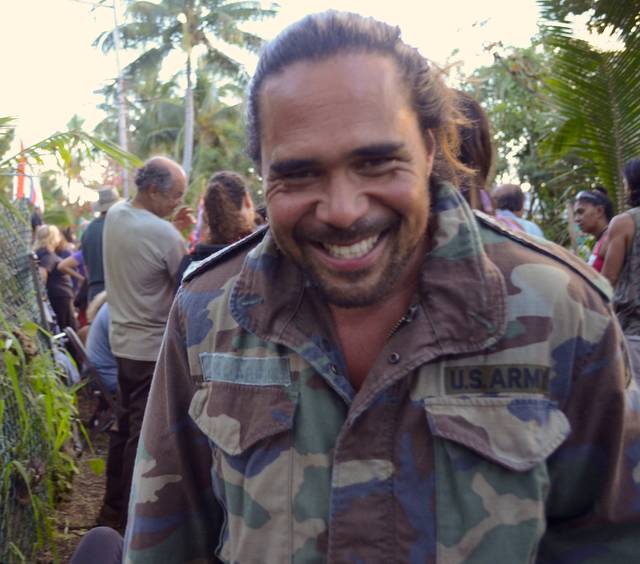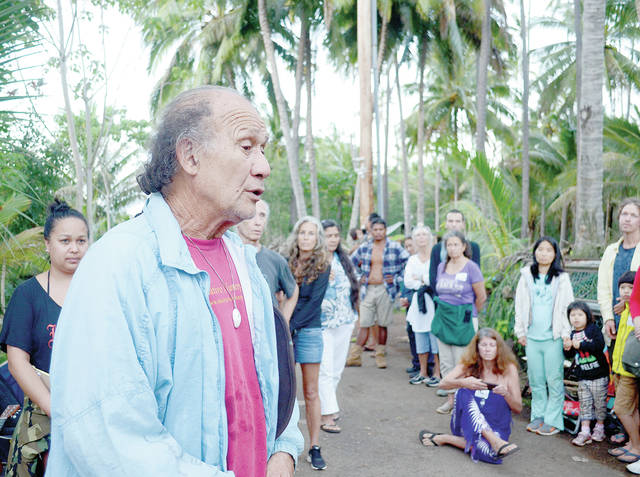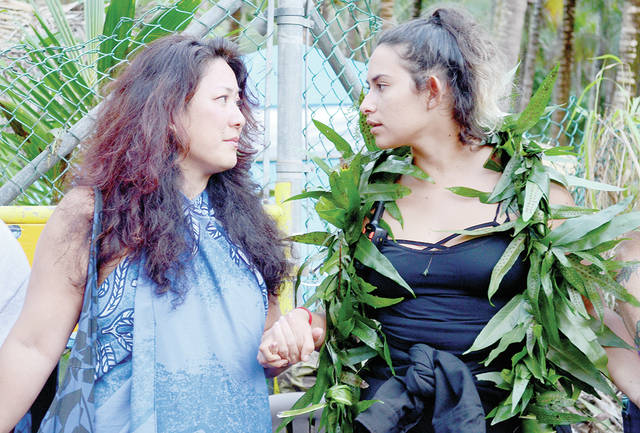LIHUE — Occupiers remain on Coco Palms property under their own direction.
Last week, District Court Judge Michael Soong ordered co-defendants Noa Mau-Espirito and Kamu “Charles” Hepa off the Wailua land they and a group have been occupying for nearly a year.
The order was effective at 6 p.m. Sunday night. On Saturday evening, a group of supporters began gathering on the property.
Some were willing to be arrested.
The hour came and went, with no response from state sheriffs, or any other law enforcement agencies.
Instead, those present participated in a solemn ceremony.
Oli were chanted, kupuna spoke words of wisdom and hope, prayers and blessings were said.
Mau-Espirito watched from across the street. Hepa watched from a different location.
Throughout the night, supporters of the co-defendants stood watch over the land. They have continued to guard the gate.
Those who remain say they won’t leave.
In a statement to TGI, Hawaii Department of Public Safety public information officer Toni Schwartz said, “An official request for assistance by the property owner or their representative has not been received by the Sherriff’s Division. Should assistance be required and requested, the SD will work with the property owner, KPD and the occupants towards a resolution to this matter.”
For safety and security reasons, Schwartz said they are not able to discuss strategies that may be utilized in any related enforcement action.
The civil trial lasted close to two months, with Mau-Espirito and Hepa representing themselves. Plaintiffs Chad Waters and Tyler Greene, who own development company Coco Palms Hui, bought the land where the famed Coco Palms Resort once stood through a special warranty deed.
“We expect all Coco Palms trespassers to comply with the law and Judge Soong’s order,” Waters said.
Mau-Espirito and Hepa claim the land through a royal patent and ancestry. They argued their right to be on the property through a Supreme Court ruling that stated Native tenants can’t be ejected from land if they’re using it for cultural purposes.
In his ruling, Soong likened their takeover of the land as hostile. The Supreme Court ruling, Soong said, is for the right to access, to enter another person’s property to hunt, gather, and exercise traditional religious and cultural practices.
“What the defendants are exercising in this case is much more akin to adverse possession of another person’s property,” he said.
Waters and Greene purchased the land from Prudential Insurance in May 2016, with plans on restoring the Coco Palm Resort that was damaged during Hurricane Iniki in 1992 and has since laid in waste.
If development moves forward, the $175 million project will boast about 400 rooms, 12,000 square feet of retail space, three restaurants, leisure areas and a four-acre cultural center.
In court, Hepa and Mau-Espirito said there are burial grounds, fishponds and endangered species on the property.
They, along with their supporters, would like to develop the land into a sustainable village.






Isn’t the concept a nation of laws, not men?
Sign up for News from Washington Examiner
SUBMIT
Recommended for You
Trump on hot mic says he will ‘100 percent’ release Devin Nunes memo
Pentagon responds to California teacher who was recorded calling US troops ‘a bunch of dumb s–ts’
FBI examining a second Trump dossier written by someone close to Clinton camp: Report
House Intelligence Committee opens investigation into DOJ, FBI
Five Supreme Court justices to miss Trump’s State of the Union
The concept is supposed to be “a government of laws, not of men,”
This writer, Bethany really needs to wise up to these attention starved freeloaders and their gullible transplant cheerleaders!
Well stated.
It’s all about greed, money and lust for more power by aggressive measures brought on by the oppressors who overthrew the Hawaiian nation and continue with the genocide of native Hawaiians through illegal laws that benefit their greed and lust of power over the innocents. If they were white Jewish and not of color, I’ll bet Soong’s decision would be of different nature.
Very good and unbiased information from this professional reporter.
HAWAIIANKINGDOM.ORG
Isn’t it a little ironic that Punohu Kekaualua is wearing a US Army fatigue jacket? Blame the US government for all the problems for ‘Hawaiians’, but wear their military uniform. Interesting.
And the government leaders will sit by until every last Hawaiian is uprooted from the aina in their own homeland.